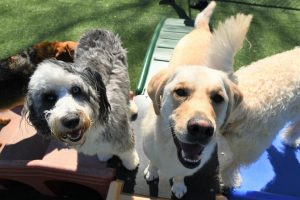
Does your dog display uncomfortable, insecure, or fearful behavior, such as lunging or barking at another person or dog, or unwarranted submissiveness? These behaviors may indicate a lack of confidence and could be the result of a negative experience or a genetic predisposition. As pet parents, we want our dogs to be comfortable and well balanced, so addressing these behaviors can help lead to a happier life for both you and your dog.
When it comes to puppies, setting them up for success is crucial in order to avoid these behaviors. The critical socialization period is 3 -14 weeks of age. This is the time for your pup to learn what is safe and not safe. During this time it is important to explore new experiences together and reward wanted behaviors. By staying active and engaging with your pup in a fun and positive way, you will not only help them learn to cope in new environments but also build a stronger bond with one another!
After the critical socialization period, a dog’s learning ability changes. This does not mean that older dogs can’t learn new tricks, it just means that they need a different and consistent approach to see results. If your dog is experiencing fear or unease, you can use repeated exposure to get them more comfortable. This technique, called desensitization, is used to make novel things seem more routine. Desensitizing your dog should be done slowly and in an environment where you can control how much your dog is exposed to (like your backyard or living room). If your dog is doing a good job and you reward them with a treat, then you’re practicing what trainers refer to as counter-conditioning. That simply means changing an unwanted behavior or response to a stimulus into a wanted behavior or response via positive association. This will help your dog associate the novel stimulus with something more positive. After you experience consistent progress at one level of exposure you will be able to progress further. Punishments, like shouting or using a shock collar, should not be used for this training because it can add to your dog’s lack of confidence. If you are starting to get frustrated then it is probably a good time for both of you to take a break and start again when you feel ready. Helping your dog cope with previous fears will take time, patience, and consistency but it will be so worth it in the long run!
All dogs can benefit from working on their confidence. Regular positive reinforcement training and games (like feeding puzzles) will help your dog stay eager and ready for new adventures to come! Our Training Team is available to answer any questions you have, so let us know how we can help.

